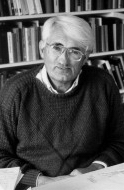 Jurgen Habermas (born in Düsseldorf, Germany) is a philosopher and social theorist in the tradition of critical theory who has integrated into a comprehensive framework of social theory and philosophy the German philosophical thought of Immanuel Kant, Friedrich Schelling, Friedrich Hegel, Wilhelm Dilthey, Edmund Husserl, and Hans-Georg Gadamer, the Marxian tradition, both the theory of Karl Marx himself as well as the the critical neo-Marxian theory of the Frankfurt School, i.e. Max Horkheimer (1895-1973), Herbert Marcuse (1898-1979) and Theodor W. Adorno (1903-1969), the sociological theories of Max Weber, Emile Durkheim, and George Herbert Mead, the linguistic philosophy and speech act theories of Ludwig Wittgenstein, John Langshaw Austin, and John R. Searle, the American pragmatist tradition of Charles Sanders Peirce and John Dewey, and the sociological systems theory of Talcott Parsons. Habermas’s work focuses on the foundations of social theory and epistemology, the analysis of advanced capitalist industrial society and of democracy and the rule of law in a critical social-evolutionary context, and contemporary (especially German) politics.
Jurgen Habermas (born in Düsseldorf, Germany) is a philosopher and social theorist in the tradition of critical theory who has integrated into a comprehensive framework of social theory and philosophy the German philosophical thought of Immanuel Kant, Friedrich Schelling, Friedrich Hegel, Wilhelm Dilthey, Edmund Husserl, and Hans-Georg Gadamer, the Marxian tradition, both the theory of Karl Marx himself as well as the the critical neo-Marxian theory of the Frankfurt School, i.e. Max Horkheimer (1895-1973), Herbert Marcuse (1898-1979) and Theodor W. Adorno (1903-1969), the sociological theories of Max Weber, Emile Durkheim, and George Herbert Mead, the linguistic philosophy and speech act theories of Ludwig Wittgenstein, John Langshaw Austin, and John R. Searle, the American pragmatist tradition of Charles Sanders Peirce and John Dewey, and the sociological systems theory of Talcott Parsons. Habermas’s work focuses on the foundations of social theory and epistemology, the analysis of advanced capitalist industrial society and of democracy and the rule of law in a critical social-evolutionary context, and contemporary (especially German) politics.
Jurgen Habermas considers his own major achievement the development of the concept and theory of communicative reason or communicative rationality, which distinguishes itself from the rationalist tradition by locating rationality in structures of interpersonal linguistic communication rather than in the structure of either the cosmos or the knowing subject. He carries forward the tradition of Immanuel Kant and the Enlightenment and of democratic socialism through his emphasis on the potential for transforming the world and arriving at a more humane, just, and egalitarian society through the realization of the human potential for rationality.
Habermas works equally comfortably in the fields of sociology and philosophy, and his magnum opus, The Theory of Communicative Action (in two volumes) addresses not only philosophies of agency and rationality, but the theories of sociologists like Max Weber, George Herbert Mead, Emile Durkheimand Talcott Parsons. In this work, Habermas counterposes the traditional idea of an objective cognitive-instrumental (functionalist) reason to other reasoning capacities that perform subjective and intersubjective duties within the rich fabric of societal interactions. From the ideas of intersubjectivity developed here, Habermas and fellow Frankfurt critic Karl-Otto Apel developed the distinctive theory of discourse ethics. One of Habermas’ earliest important philosophical exchanges was with Hans-Georg Gadamer over the applicability of Gadamer’s idea of interpretation to the critique of ideology, one of Habermas’ prime foci. Because of the varied applicability of Habermas’s work, from psychoanalysis to action theory to epistemology to hermeneutics, he is called one of the “four or five most important philosophers of the twentieth century” and akin to Karl Marx in the variety of interpretations that his ideas have spawned in many fields, including literary theory, economics, and public policy.
As a second-generation member of the Frankfurt School of critical theory, Habermas was a student of Max Horkheimer and Theodor Adorno. In his wide-ranging and varied works, he had broken with the anti-rationalist, anti-Westernist stance of the previous generation of Frankfurt theorists and taken a different route in his critical appraisal of Western institutions and rationality. Habermas stresses the humanist side of Karl Marx‘s work as a critic, and has written on the Hegelian tensions between theory and practice in philosophy. Habermas is particularly notable for his defense of a Kantian conception of rationality, which have been assailed by other postmodern thinkers.
Major Works of Jurgen Habermas
– Knowledge and Human Interests, 1971
– Toward a Rational Society, 1971
– Theory and Practice, 1973
– Legimation Crisis, 1975
– Communication and the Evolution of Society, 1979
– Philosophical-Political Profiles, 1983
– The Theory of Communicative Action, Vol. 1, 1984
– The Theory of Communicative Action, Vol. 2, 1987
– On the Logic of the Social Sciences, 1988
– The Structural Transformation of the Public Sphere, 1989
– The New Conservatism, 1989
– Moral Consciousness and Communicative Action, 1990
– Postmetaphysical Thinking, 1992
– Justification and Application, 1993
– The Past as Future, 1994
– Between Facts and Norms: Contributions to a Discourse Theory of Law and Democracy, 1997
– The Philosophical Discourse of Modernity
– On the Pragmatics of Social Interaction
– The Inclusion of the Other
– The Postnational Constellation

Someone essentially help to make seriously articles I would state. This is the very first time I frequented your web page and thus far? I surprised with the research you made to make this particular publish amazing. Excellent job!
fantastic publish, very informative. I ponder why the other specialists of this sector don’t notice this. You must continue your writing. I’m sure, you’ve a great readers’ base already!